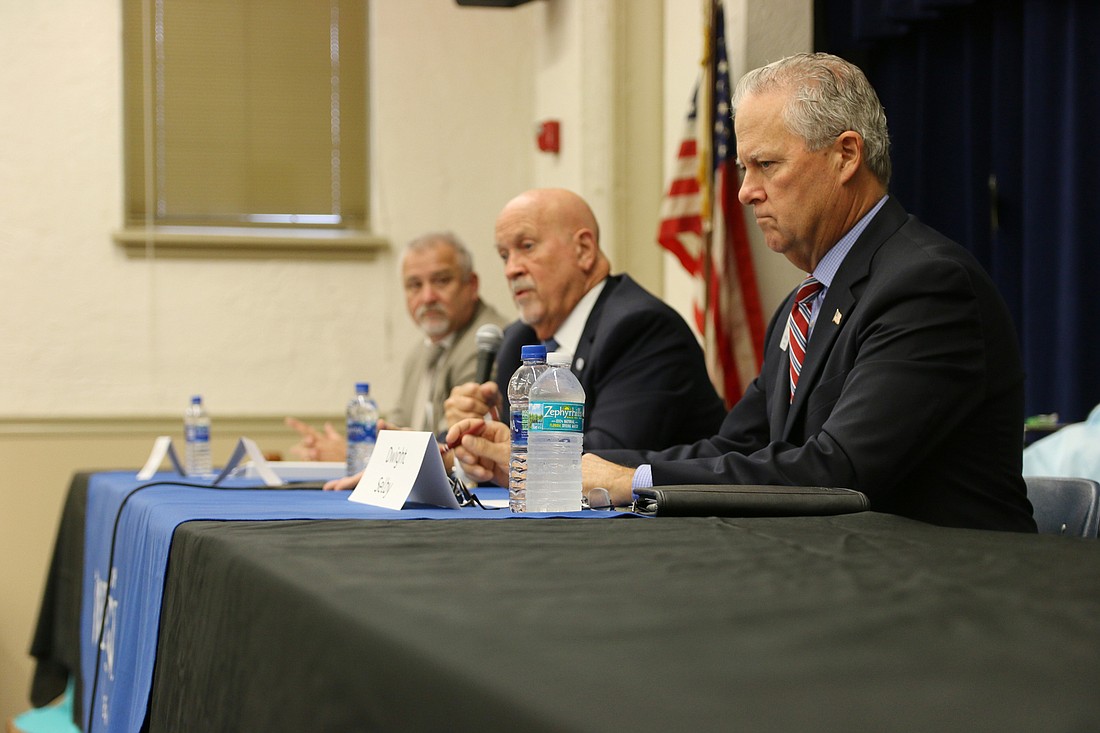- April 23, 2024
-
-
Loading

Loading

There is no Plan B that can equal what a half-cent sales tax could do for Volusia County, said Volusia County Council Chair Ed Kelley at a town hall meeting on the subject at Ormond Beach Elementary on Tuesday, March 26.
“You think I’m going to try to raise your property taxes?" Kelley said. "No.”
Voters will have a say this coming May whether or not the proposed half-cent sales tax, which is estimated to generate $45 million for infrastructure countywide, will pass. Should it pass, Ormond Beach will gain $2.3 million for infrastructure and water quality projects for the next 20 years. The sales tax has been discussed for over a year, but after gaining approval from all 16 municipalities, was put on hold by the County Council in May 2018. It resurfaced early this year, following the county addressing its 15-year-old impact fees by raising them.
At the town hall meeting, sponsored by the Daytona Beach News-Journal, Kelley said that many of the projects that would be aided by the proposed half-cent sales tax have been on the cities' wishlists for years. However, there has not been enough funding to take care of the issues.
Impact fees can't be used to resurface or repair roads, he explained as a resident brought up the impact fee topic. With a half-cent sales tax, local government will be able to leverage the generated funding with the state and the federal government. He also reiterated a common talking point in favor of the tax: between 30-40% of the revenue will be generated by tourists and visitors.
Kelley told the estimated 75 attendees that this is why there isn't a plan B.
“If you can come up with one, share it," Kelley said.
His comments were made in response to Ormond-by-the-Sea resident Cynthia Sadowski, who said she was going to vote no on the sales tax in May. She called the lack of a Plan B a "glaring incompetence."
“That’s not how you run a life," Sadowski said. "That’s not how you run a family. That’s not how you run a business and it is definitely not how you run a city or a state. You always have a plan B.”
She said she believed the county didn't have a plan in the first place, and if it did, it wasn't a "good one" that took into account the people's best interests. Growth and business are not always the best answers, she said, and cited Granada Pointe. She said a group of people stood up and said they didn't want the project, and that they weren't listened to.
Most of the citizen engagement and concern regarding the Granada Pointe development came after the land was clear-cut.
Sadowski said that what the residents are getting in return are a Wawa gas station, a car wash and a new traffic light.
City Commissioner Dwight Selby, who was also on the panel along with County Manager George Recktenwald, said the city has an "aggressive" repaving plan to for the 179 miles of city roads it maintains. The city dedicates a half million dollars toward this with ad valorem tax revenue, but still, Selby said roads are on a 50-year cycle.
“We’re really not keeping up," Selby said. "The city owns a lot of stuff, and stuff has to be maintained.”
Kelley said all local government is doing is identifying the needs, the projects and the solutions.
“That’s the best I can do," Kelley said. "I’m a messenger. I didn’t create [the problems], I have to pay the same taxes you do. I have to pay the same property tax that we all do, and I don’t like doing that.”
What he would like, he said, is for the cities and the county to have the necessary infrastructure to provide clean water and better transportation.
Ormond Beach resident Linda Williams said what is being ignored in the half-cent sales tax discussions are environmental concerns, naming carbon emissions and smart growth. She also advocated for improving transit systems, though the sales tax can't be put toward that.
Selby mentioned the city's new downtown steering committee meant to help update the downtown master plan. Selby said hopes emphasis on walkability and more residences in the downtown come out of that committee. That's what he believes will help the area the most, though he mentioned the backlash received after the commission approved developer Bill Jones' request in 2017 to build three-story multi-family residences on New Britain.
“You would’ve thought we were giving the key to the city to Putin," Selby joked.
On voter turnout, both Kelley and Selby expressed high hopes.
“I think the turnout could be unbelievable," Selby said. "I think the turnout could be incredible.”
This is the first time Volusia has carried out a mail-in election countywide, Kelley said, and there should be a good turnout because people can fill the ballots out from home. Selby, who said he has been an absentee voter for over a decade, said he loves it.
Also on the ballot of Ormond Beach residents will be the commission term and length referendum. Voters will decide if the commission continues to hold two-year terms or switch to staggered four-year terms, and whether candidates should participate in a primary. Collection boxes will be placed throughout the county to collect ballots, which will be mailed on May 1 and will need to be turned in by May 21.
“If you don’t take the opportunity to vote, it’s on you," Kelley said.